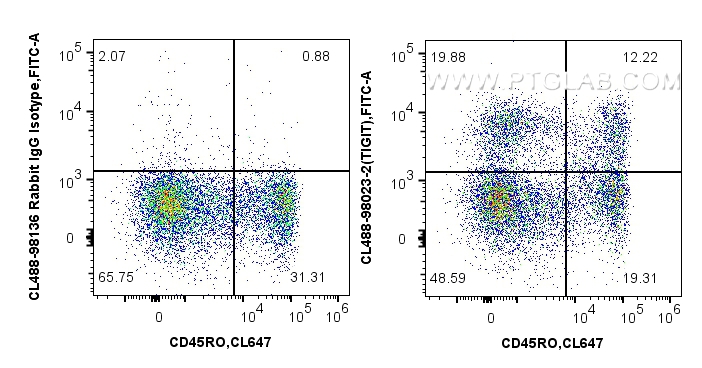验证数据展示
经过测试的应用
| Positive FC detected in | human PBMCs |
推荐稀释比
| 应用 | 推荐稀释比 |
|---|---|
| This reagent has been pre-titrated and tested for flow cytometric analysis. The suggested use of this reagent is 5 ul per 10^6 cells in a 100 µl suspension or 5 ul per 100 µl of whole blood. | |
| Sample-dependent, Check data in validation data gallery. | |
产品信息
CL488-98023-2 targets TIGIT in FC applications and shows reactivity with human samples.
| 经测试应用 | FC Application Description |
| 经测试反应性 | human |
| 免疫原 | Recombinant protein 种属同源性预测 |
| 宿主/亚型 | Rabbit / IgG |
| 抗体类别 | Recombinant |
| 产品类型 | Antibody |
| 全称 | T cell immunoreceptor with Ig and ITIM domains |
| 别名 | 240423C7, T-cell immunoreceptor with Ig and ITIM domains, VSIG9, VSTM3 |
| 计算分子量 | 26 kDa |
| GenBank蛋白编号 | NM_173799.4 |
| 基因名称 | TIGIT |
| Gene ID (NCBI) | 201633 |
| RRID | AB_3673368 |
| 偶联类型 | CoraLite® Plus 488 Fluorescent Dye |
| 最大激发/发射波长 | 493 nm / 522 nm |
| 形式 | Liquid |
| 纯化方式 | Protein A purification |
| UNIPROT ID | Q495A1-1 |
| 储存缓冲液 | PBS with 0.09% sodium azide and 0.5% BSA , pH 7.3 |
| 储存条件 | Store at 2-8°C. Avoid exposure to light. Stable for one year after shipment. |
背景介绍
TIGIT (T-cell immunoreceptor with Ig and ITIM domains), also known as VSIG9 or VSTM3, is an immune receptor expressed on T cells, including Treg and memory subsets, as well as on NK cells (PMID: 19011627). It contains an immunoglobulin variable domain, a transmembrane domain and an immunoreceptor tyrosine-based inhibitory motif (ITIM). TIGIT binds to poliovirus receptor (PVR, also called CD155) with high affinity, and also to PVRL2 (CD112) with lower affinity. The interaction of TIGIT with PVR on dendritic cells increases the secretion of IL-10 and decreases the secretion of proinflammatory cytokine and suppresses T-cell activation by promoting the generation of mature immunoregulatory dendritic cells. TIGIT can inhibit NK cytotoxicity directly through its ITIM (PMID: 19815499).
实验方案
| Product Specific Protocols | |
|---|---|
| FC protocol for CL Plus 488 TIGIT antibody CL488-98023-2 | Download protocol |
| Standard Protocols | |
|---|---|
| Click here to view our Standard Protocols |

